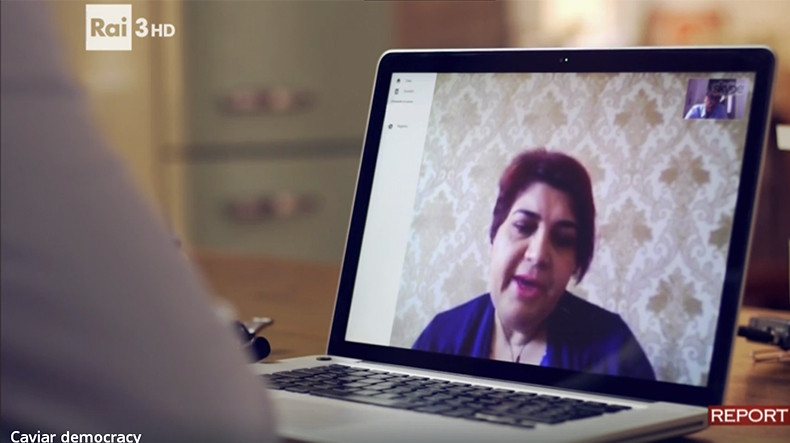
Italian Rai 3 TV channel reports on repressions against journalists and election fraud in Azerbaijan
Independent journalists cannot find jobs in Azerbaijan. If they decide to start a blog, they risk their freedom, and if they continue to insist on their own point of view, they risk their lives, Caucasus Civil Initiative Centre's advisor EminAslanov said in an interview with the Italian Rai 3 TV channel’s journalist Paolo Mondani in the framework of the program dedicated to Azerbaijan’s “Caviar diplomacy.”
Inher turn, Azerbaijani online media outlet Meydan TV’s editor GunelMovlud says she had to leave Azerbaijan because of her journalist activity. In order to put pressure on her, the ruling regime arrested her two brothers.
According to famous Azerbaijani human rights defender RasulJafarov, he was imprisoned for a period of one year and eight months. The human rights defender was releasedafter the decision of the European Court of Human Rights (ECHR), which recognized the violation of Jafarov’s rights by the Azerbaijani government. “Europe is always late and reacts, when it is already too late,” the human rights defender notes.
The report also covers the way, in which elections are held in Azerbaijan. Itis noted that in 2013, presidential elections were held in the country. The OSCE Office for Democratic Institutions and Human Rights (ODIHR) and the European Parliament sent observatory missions to Azerbaijan in order to assess the legitimacy of the elections.
Tana de Zulueta, head of the OSCE ODIHR observatory mission, notes that what she saw was simply striking, as the ballot boxes were full before the start of the voting. Suchcasesweredocumentedat 36 pollingstations.
However, the head of the European Parliament’s observatory missionPinoArlacchi states that the existing regime in Azerbaijan is allegedly “free, just, and transparent.”
Tana de Zuluetais of the opposite opinion. According to her, they wanted to document some kind of progress in the election process in the OSCE ODIHR mission report; however, they did not see anything positive.
It is no coincidence that during the 2015 parliamentary elections, OSCE did not send an observatory mission to Azerbaijan because of the policy carried out by the authorities.
European Parliament’s Italian deputy from 5-star movement Laura Agea notes that the Azerbaijani government tried to limit the observers’ activities in every possible way and make the effective election observation impossible.
“When you do not want others to see what is going on in your house, this is the first thing you do,” the deputy says.
On 1 November 2015, Azerbaijan held parliamentary elections, where 767 candidates were struggling for the 125 seats in the Parliament. According to preliminary data issued by the CEC, the ruling YeniAzerbiajan party won, receiving 70 seats in the legislative body of the country. The voter turnout was 55.7 percent: 2.89 million voters out of 5.2 million took part in the elections.
The elections were observed by 503 international monitors from 40 organisations, including PACE,Interparliamentary Assembly of the CIS and the Parliamentary Assembly of Turkic-speaking Countries. There were reports about numerous irregularities in the polling stations. In particular, there were cases of ballot stuffing, voting carousels, and so on.
International agencies took up rather stern stance over the upcoming parliamentary elections. The OSCE Office for Democratic Institutions and Human Rights (ODIHR) announced that, due to restrictions imposed by the Azerbaijani authorities, ODIHR had no choice but to cancel its mission to observe the country’s parliamentary elections. TheEuropeanParliamentfollowedthesuit.
Newsfeed
Videos






























